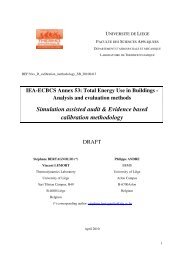Create successful ePaper yourself
Turn your PDF publications into a flip-book with our unique Google optimized e-Paper software.
more than a <strong>Google</strong> user’s misgivings<br />
over the limitations of her existing<br />
Web-based email account: It was difficult<br />
to manage efficiently, and she was<br />
constantly forced to delete mail to remain<br />
under the 4MB storage limit.<br />
Her complaint came to the attention<br />
of a <strong>Google</strong> engineer, who thought<br />
that developing a solution would<br />
make a great 20% time project. The<br />
result was Gmail, an email service you<br />
can use and search from anywhere,<br />
with gigabytes of storage capacity.<br />
The Ten Things. <strong>Google</strong>’s management<br />
has codified 10 truisms that underlay<br />
the way it tries to do business<br />
and how it regards <strong>Google</strong>’s role on<br />
the Web.<br />
1. Focus on the user, and all else<br />
will follow.<br />
As <strong>Google</strong> has grown, it has used<br />
one criterion to evaluate each potential<br />
change: Will it benefit the end user? If<br />
not, it doesn’t happen. Nor should any<br />
changes erode what users have come to<br />
expect: a straightforward interface, no<br />
waiting time on search results, results<br />
that haven’t been manipulated by<br />
selling placement, and advertising that<br />
remains relevant and unobtrusive.<br />
2. It’s best to do one thing really,<br />
really well.<br />
Some search engines seem as<br />
though their primary goal is to distract<br />
you from what you showed up<br />
to do in the first place. Drop by another<br />
prominent site, and you’re<br />
bombarded with news headlines, entertainment<br />
headlines, a list of the<br />
week’s new movies, links to horoscopes<br />
and a music service, weather<br />
and traffic reports, and more.<br />
<strong>Google</strong>’s landing page looks as austere<br />
as ever. Although the company is<br />
developing other products and services,<br />
you never get the sense that these<br />
interfere with the original mission.<br />
3. Fast is better than slow.<br />
Whenever <strong>Google</strong> provides you<br />
with search results, near the upper<br />
right of the page you’ll see how long<br />
it took. We’ve never seen one that<br />
has exceeded a fraction of a second.<br />
To ensure that things move at the<br />
A LL A BOUT G OOGLE<br />
maximum possible speed, <strong>Google</strong><br />
developed new computer configurations<br />
and search algorithms, and<br />
prunes the excess from pages to keep<br />
them streamlined.<br />
4. Democracy on the Web works.<br />
To determine how Web pages are<br />
ranked in terms of relevance, <strong>Google</strong><br />
doesn’t rely on the number of hits the<br />
pages get, but by analyzing the number<br />
of other sites that link to them, and<br />
those pages’ place in the rankings.<br />
Using this method, Web sites are, in<br />
essence, voting for their peers.<br />
5. You don’t need to be at your desk<br />
to need an answer.<br />
The need for information<br />
transcends office<br />
computers and<br />
wireless-enabled notebook<br />
PCs. <strong>Google</strong> is<br />
committed to bringing<br />
search results to cell<br />
phones, PDAs, and<br />
even cars . . . and,<br />
when necessary, developing<br />
new technologies<br />
that make Web<br />
pages viewable in gadgets<br />
that otherwise<br />
couldn’t display them.<br />
6. You can make<br />
money without doing<br />
evil.<br />
This time, evil comes<br />
down to something<br />
quite specific: advertising.<br />
Because <strong>Google</strong><br />
refuses to let paid<br />
ads create a conflict of interest that<br />
compromises the integrity of its search<br />
results, ads are labeled “Sponsored<br />
Links,” and no one can buy a higher<br />
placement to override their page rankings.<br />
The company doesn’t permit advertising<br />
to distract from search<br />
results, either. Ads are text-only, kept<br />
separate from the results, and appear<br />
only if relevant to the search terms.<br />
7. There’s always more information<br />
out there.<br />
<strong>Google</strong> may have made a breakthrough<br />
by indexing more Web pages<br />
than any other search engine, but this<br />
<strong>Google</strong>’s Desktop Search<br />
functions bury Windows<br />
XP’s built-in search, which<br />
won’t be improved until<br />
the next operating system<br />
release in 2006.<br />
was only a start. The Internet consists<br />
of more than just text pages written in<br />
standard HTML (Hypertext Markup<br />
Language) code. To expand its search<br />
horizons and make more of the available<br />
data accessible, <strong>Google</strong> developed<br />
ways of including databases, graphic<br />
images, and PDF (Portable Document<br />
Format) files and other document<br />
formats, such as work created with<br />
Microsoft’s Office Suite.<br />
8. The need for information<br />
crosses all borders.<br />
More than 50% of <strong>Google</strong>’s<br />
searches are conducted by users outside<br />
the United States. <strong>Google</strong> provides<br />
language tools<br />
that let users translate<br />
foreign pages, and<br />
while the results can be<br />
grammatically clunky,<br />
you can usually understand<br />
the point. As<br />
well, users can limit<br />
searches to pages in<br />
any of 35 languages<br />
and set the interface to<br />
display in any of 116<br />
(so far) languages . . .<br />
although we suspect<br />
that the Elmer Fudd<br />
and Klingon options<br />
will draw a very limited<br />
user base.<br />
9. You can be serious<br />
without a suit.<br />
This applies mainly<br />
to the corporate culture,<br />
in which people<br />
don’t take themselves so seriously<br />
that they never hear innovative ideas<br />
that might get bogged down in a<br />
stricter hierarchy. Instead, even suggestions<br />
that emerge from cafeteria<br />
conversations get tested and tried as<br />
soon as possible.<br />
As one employee posted in his blog,<br />
“[T]here isn’t a lot of ‘stop energy’ at<br />
<strong>Google</strong>. My colleagues in engineering,<br />
marketing, etc. don’t react to new<br />
ideas with ‘You can’t do that,’ but<br />
usually with ‘cool’ and a tip as to who<br />
to talk to in the organization who is<br />
likely to be of the most help.”<br />
Reference Series / Guide To Using <strong>Google</strong> 15

















